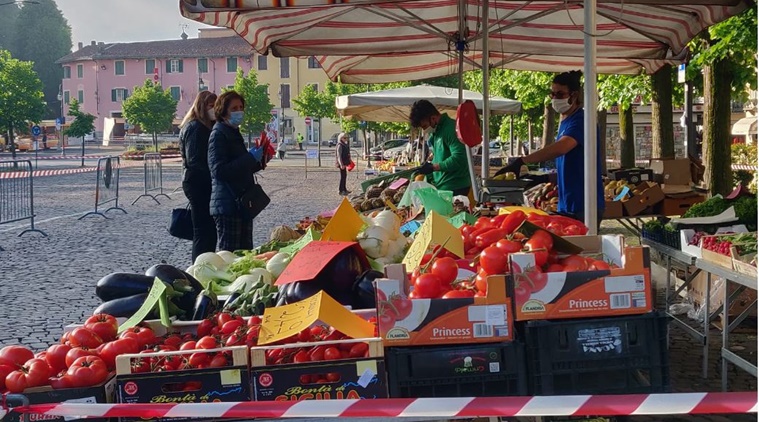 Before the lockdown, most of the town’s 30,000-odd inhabitants would trek to the piazzas, where small-scale producers and farmers from across the region would come to set up shop. (Photo: Damini Ralleigh)
Before the lockdown, most of the town’s 30,000-odd inhabitants would trek to the piazzas, where small-scale producers and farmers from across the region would come to set up shop. (Photo: Damini Ralleigh)
Food is an important part of Italian culture — and their interest is not limited to the delicacies that can be whipped up in the kitchen. They take shopping for fresh produce very seriously. So it was surprising when the resumption of farmers’ markets in the provincial town of Bra — which also happens to be the birthplace of the Slow Food movement— in the northwest region of Piedmont, after seven weeks of lockdown, was met with a tepid turnout.
Prime Minister Giuseppe Conte announced the government’s decision to cut back on the restrictions from May 4 on Sunday. Terming this “phase two” of the government’s reaction to the pandemic, Conte said that it’s time to “co-exist with the virus” and reclaim public spaces while respecting the rule of social distancing.
Before the lockdown, most of the town’s 30,000-odd inhabitants would trek to the piazzas, where small-scale producers and farmers from across the region would come to set up shop. Rows of stalls stacked against each other showed off the best of the country’s gastronomic heritage — cured meats hanging from hooks, pyramids of cheeses and baskets filled with fresh fruits and vegetables.
But Wednesday’s farmers’ market — the first in nearly two months — bore no resemblance to what they once were. It had shrunk to a fraction of its size and was managed by the police who let people in ones or twos at a time and with only a handful of producers and farmers purveying their goods.
“This was quite a shock. The areas were marked by red and white tape and the police stood at the entrance as well as the exit to make sure that people were complying with the rules. It doesn’t feel natural to have authorities watch over you while you’re shopping for fruits and vegetables,” says food writer Bruce McMichael, adding, “but it’s still nice to be able to go to the farmers’ market and get your food and see big baskets filled with fresh produce instead of empty bins or food packaged in plastic as at the supermarket”.
This is the beginning of the new normal. People stand at a distance, barely uttering a word to the other, quickly wrapping up their business and rushing back home. “This is us co-existing with the virus. We can’t just stay at home till they find a vaccine for it and it’s reassuring to see people erring on the side of caution — wearing masks, respecting social distancing, ensuring that they and everybody around them is safe. It helps build confidence in a situation as uncertain as this,” says Paula Thomas, Communications Officer, Slow Food International.
Freelance wine educator, and Paula’s husband, Scott, concurs: “There is a heightened sense of caution and awareness — and I don’t think things will ever be the same as they were — but there is a greater sense of gratitude. Even while I was shopping, some of the vendors just ended up giving me extra produce. The sense of camaraderie was overwhelming for everyone.”
However, it will take time for people to start trusting the streets again and producers too understand why people are reluctant to go out to shop. “People are not earning any more or have taken pay cuts so they aren’t shopping the same way they used to. It will take time to get things back to normal but the sooner we start, the better it is for everybody,” says Giulia Bo, owner, Bo Mauro — a butcher’s shop in Bra and who had come to the market yesterday morning with a truck filled with her meat products.
“I understand that people don’t want to come here to the farmers’ markets because they are afraid of the virus but many of the producers here also supply to the supermarkets. If you consider what you buy from there safe then why not buy it from us directly? The farmers get a fair price and you get the same quality of food, if not better,” she adds.
Trepidation though is slowly turning into trust in Bra. Radio presenter Giulia Catania says the “sense of calm and order at the market place makes me feel like we’re on the road to recovery. It will get better, we just have to keep working towards it.”
Since late March, Italy’s record of new infections has been on a steady decline though the total number of fatalities stands over 27,500 — still the highest in Europe and second only to the United States globally.
The rules will continue to relax from May 4 leading to the re-opening of parks, factories and construction sites. Shops such as salons and restaurants or bars are to keep their shutters down till May 18, but can start takeaways allowing one person in at a time while schools will remain closed till September.